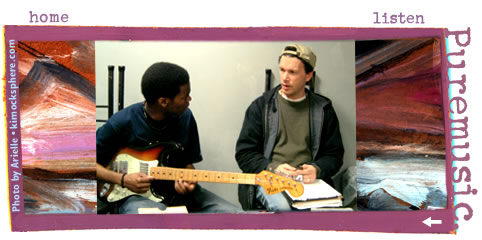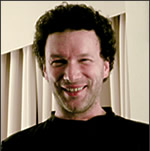
A CONVERSATION WITH STEVE KIMOCK (continued)
SK: Hemp. Very different, very cool. The hemp cone thing is very cool. There will be some development around the hemp cone speaker and amp lines that will make a lot of sense for me, shortly, I think. It has real, real great potential. They seem to have a much smaller kind of on-axis danger zone. These hemp cones, man, they just have great fundamental. And you can just put them right in your face and listen, and they sound really good. So I think they're going to wind up having applications with lower-power amplifiers, where you can really set them up there and listen to them, and get all the benefit of the good low-powered amp sounds, and monitor the thing to get that sound. I'm excited about the speaker things that are happening. And again, lots of good amp things. And you know that I've checked it out.
PM: Some things never change. When you speak about technical things, you do so with great passion and interest.
SK: I love it so much.
PM: It's a never-ending search for tone.
SK: I'm not searching for a tone, I'm just having fun recognizing the trade-offs, you know. It's like, "I want it to be a little more like this." And then, "What have I got to give up to get it there?" See, it's just trade-offs.
PM: Right.
SK: I'm not searching for "a sound." It's not any particular sound. I'm just trying to get a little pile of stuff together that I can get big, clean head room, nice clean sounds, which is a different thing than you think it is, and then get some great distortion sounds without having it being tied to any particular volume, you know, so I wind up running single amps dry on a pair of speakers, and then running two big amps in stereo, and 4x12's, and little single-ended class A amps in front of stereo amps, and little classic power amps in the loops of bigger amps. Messing with the formula -- how much gain the amplifier is having for how much volume you use, playing with various kinds of power scaling factors, without getting into specific output stage designs, just using the usual stuff. It works, pretty much, in the size rooms that we're playing. Between a couple hundred people and a couple thousand people, you know, I seem to be able to get away with it. Past that, it's a little difficult.
PM: Yeah, then you're at the mercy of other elements.
SK: Yeah, and stuff just sort of gets squashed washing back from the house. The stage is always intruded upon by a giant PA.
PM: Yeah. Then you're at the mercy of the house sound system.
SK: It works in reasonable venues. I can get a good, decent enough clean sound, loud enough that I can play sensitively, and it sounds okay. And in small rooms, I can fix stuff so that I can still get a big, fat, punchy transformer, you know, meltdown kind of sound without it being too loud, so just that pile of stuff allows me to do that. And that's kind of what I'm going for, just to have a range of stuff to work with, and then have a little -- you know, some range of instruments to work with, to play off that. So if I want a clean, single-coil kind of sensitively played sound, I pick up the guitar, and I go back, and I'll plug something in and unplug something else, I'm there. And then if I want it to sound like it's blowing up, I'll get a different guitar, go back and plug something in.
PM: Before we wind this up, I just want to make sure we said everything about where you feel the music is coming from. We talked about being perhaps the last of the great San Francisco psychedelic guitar players, rather than being dubbed a jamband. Is there anything else about what you're trying to do as a musician that we may not have covered to your satisfaction? You know, if you think about "what it is I'm trying to do," did we say all that we need to say about that?
SK: No, not really. Not really, but it's kind of difficult to talk about. We spoke earlier about the audience, the community and social aspect, and the fellowship part of it. Getting people together in a group and then they're using the music. We're basically playing their party. You know, they're not coming to our recital, we're playing at their party. There's that aspect of it.
The way the world is, man, the way the world has turned out to be, a very strange world, there's not a lot of reality in our culture. It's kind of bankrupt, you know, we're really not clued in to what's really going on. I don't know how else to say this. But our institutions -- the schools, the churches, the government -- it's not in their best interests for us to know the difference between right and wrong. I mean, I'm a good Roman Catholic boy, as you yourself were probably raised a good Roman Catholic boy.
PM: I was indeed.
SK: You see what that means these days.
PM: Yeah, they got a problem.
SK: They got a big problem. But it's just kind of like that everywhere. It's just so not real. There are things that happen to people, man, when they listen to music -- and I'm not going to get too into it for the purposes of this interview, we'll do it another time, probably. But the key thing about music is that it happens in time, right? And when you're playing with time like that, with people, and it's happening in time, and you get to some kind of a flow state with the whole thing, where for just an instant in the night [snaps his fingers], the thing opens up, and people simultaneously are aware that they're having this experience, that they're just really being in the moment, they're being in the now. They're not experiencing the frustration of having grown up in this incredible duality of not knowing the difference between right and wrong, and not knowing the difference between food and poison, or war and peace, or having a job or being a slave or anything like that. They're not living in their minds, they're just in the moment, for real. Maybe right before they run their snow board into a tree or something like that, they get it, you know, but they don't get it often. And it happens a lot with music, and I think that's what attracts people to it. And ultimately, getting into that moment, getting into that flow state, is where I'm coming from, that's where I want the thing to go. I want it to go to a place where you're so engaged that you disengage from your mind, basically, and it's all there all at once. Everything all at once, finally, instead of, "I'm standing here and my feet hurt, with this girl, and she's dancing with that guy." You know what I mean?
PM: Yeah.
SK: Ultimately, that's the hook in the music thing, the experience of it in a group with live performers and an actual audience. Having that kind of vibe, that kind of energy going around, is how we get to those states. That kind of energy will flow right into a now, where people simultaneously are in the now. That is some powerful shit. That's reality. That's real, as close as you're going to get to some real reality. That's real, not the rest of this illusion and duality. So yeah, it's to get out of your mind.
 |
print (PDF) |
| listen to clips | |
| kimock.com | |
| kimocksphere.com | |
| puremusic home | |
| archives | |